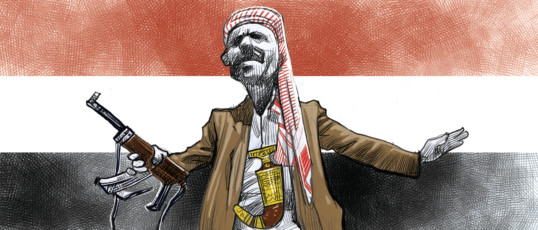
Despite their attempt to placate the chaotic political scene in Yemen, many are increasingly fearful of the rise of the Al Houthis, an offshoot Zaydi brand of Shiites in the north of the country. They are worried that this group is aiming to become the next political masters whose ambitions are to establish an Immate especially as many of their members believe in the compatibility of Islam and politics.
Critics argue that the Al Houthis, established as a political movement in the 1990s and in the early half of 2000s want to reorder regional alliances and establish an alleged link with Iran and Hezbollah in Lebanon, although it is claimed their version of Shiite is totally different and they are more akin to Sunnis.
On the domestic level as well, fear of their strength is now soaring not least of all because of their final takeover on July 8 of the city of Amran, just 50 kilometres north of Sana’a, prompting speculations they indeed want to muscle the Yemeni capital from the hands of Yemeni President Abd Rabbo Mansour Hadi and establish their presence there. The fact that Al Houthi fighters adhered to his appeal and left the city soon after that did not calm the fears of the government, the Al Ahmar tribal family that controls the city of Amran and the Islah party, that is reputedly made up of Sunnis. This is because Al Houthi fighters have been trying to take over the city since early 2014.
However, it may be argued it was their coffers that they were interested in replenishing. While in the city, they seized the headquarters of the 310 Brigade of the Yemeni regular army and looted more than 50 tanks, armoured vehicles and rocket launchers according to local media sources. They are now using them to bolster their military strength and weight vis-a-vis the state and the other political and tribal groupings.
The incident tells much about the intractability of Yemen politics where the fault lines are blurred as is the relationship between the Al Ahmar family, Islah and of course the military that has become intertwined over the years with the state and government. The first two had been pro-government, save the period when they turned against the government during the 2011 Arab Spring in the country that led to the forced removal of the 33-year-rule of Ali Abdullah Saleh who is an Al Houthi, but in denial to the aspiration of his kinsmen.
Moreover, the intractability goes much further with the rise of the Al Qaida in the Arabian Peninsula that dominates the middle and southern parts of the country. They are vehemently opposed to Al Houthi aspirations, which they believe is much more insidious and more than what their leaders admit and have an eye on playing a greater role in the future of Yemen, if not wanting a complete takeover.
The establishment of their rule on Saada in the north of the country supports this notion. Al Houthi fighters, it is argued, exploited the lawlessness emanating from the popular uprisings in 2011 and opportunistically seized power of this northern province, which is right on the border of Saudi Arabia and is likely to be a flashpoint, as it was the case in 2009 when there was a brief Saudi air raid against them.
Today, the Al Houthis control the Jawf province to the east, which it took at the same time as Saada. Although they may have left the city soon after, they still control major parts of the Amran Governorate and its well-trained fighters are eyeing the Hajjah Governorate, which they are slowly taking control of. This is mainly because of weak state control, the political infighting emanating from within Yemen’s social structure and because of the experience that Al Houthi fighters gained through six years of fighting against the government of former president Ali Abdullah Saleh — between 2004 and 2010.
Because of their increasing territorial expansion in the north and north-east of the country, the Al Houthis are being criticised for creating a “state within a state” where they have become the political masters over a vast geographical terrain and which the central government can play no role in. Today, the Al Houthis are administering the regions under its control, especially the Saada Governorate, manning checkpoints, maintaining roads, running the local government and administering the judicial system.
While it may be difficult not to accuse the Al Houthis of wanting to gain ultimate control of Yemen, its leaders and members, whose figures and numbers are difficult to obtain, have clearly stated that they do not want separation from the rest of the country and/or independence but seek regional autonomy, religious freedom and greater democracy ideally based on federalism.
To prove their point, they agreed and willingly so, in the government-instituted National Dialogue Conference that included a series of meetings in 2013 and early 2014 to set the country on a political reform course, to implement a peace plan for the warring factions and draw up a new draft constitution and referendum approving it for what is being awaited as the rise of a new Yemen by early 2015. With the various difficulties facing the country, all the cards are on the table.
Marwan Asmar is a commentator based in Amman. He has worked in journalism for many years and has a PhD in political science from Leeds University in the UK.









